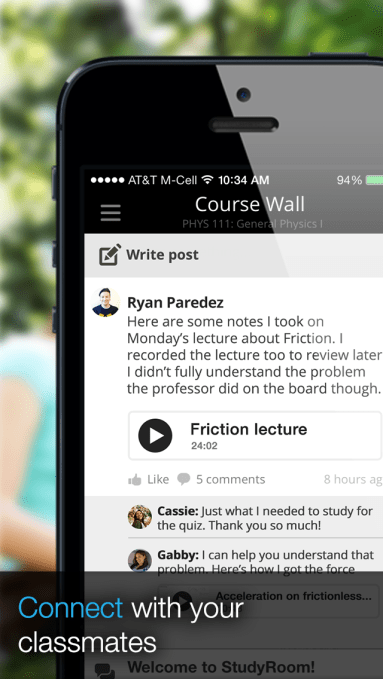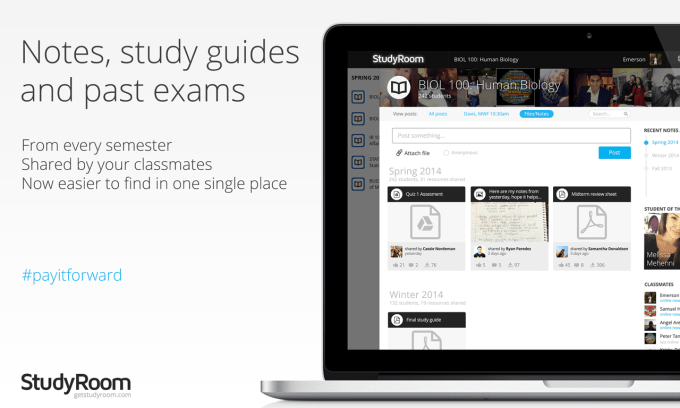Launching publicly on the TechCrunch Disrupt stage this afternoon is a company called StudyRoom, which aims to take student study groups and tutoring online, and make them more social. The company has already been running trials of its program in six universities, starting this spring, and now claims to reach 40,000 students across the U.S. who use it as a platform for social, peer-to-peer learning.
Explains co-founder and CEO Emerson Malca, the idea for an online student-led studying platform is something he was inspired to build, having been a tutor himself. He said the experience helped him to understand that sometimes the best way to learn things is to teach others.
One incident really got Malca thinking about how prevalent the problem still was today, was when a friend came to him for help with her physics homework. He asked her why she didn’t just ask someone from her class, and she said she only had two phone numbers for fellow students. One didn’t reply, she told him, and the other didn’t know how to do the problem.
“We realized nothing had changed at all since we were in college,” says Malca, describing he and his co-founder Pindi Albert’s reaction to hearing this news. “For us it was shocking to see that the most social, most connected generation ever couldn’t get in touch with the people they see everyday in class,” he says.
[gallery ids="1053479,1053480,1053481,1053482,1053483,1053484"]
How It Works
With StudyRoom, that changes. The online portal lets students sign up and locate their class’ page at their supported school. Here, students are sharing their lecture notes, asking questions about homework, sharing resources, collaboratively building study guides, forming study groups, and asking each other for help.
Meanwhile, the school page, which is something like a Facebook news feed of all the activity at that particular college or university, includes a broader array of content, including posts about events, social activities, students asking about various professors, and more.
 What makes StudyRoom different from other e-learning platforms designed for the classroom is that it’s 100% student-led. “We don’t want to become another lame BlackBoard that sells to universities,” says Malca. “One of our biggest differentiators is that we’re building a product that students really like.” He says that some teachers have joined as well – they are allowed – but it tends to be the “cool” professors.
What makes StudyRoom different from other e-learning platforms designed for the classroom is that it’s 100% student-led. “We don’t want to become another lame BlackBoard that sells to universities,” says Malca. “One of our biggest differentiators is that we’re building a product that students really like.” He says that some teachers have joined as well – they are allowed – but it tends to be the “cool” professors.
As you may expect, not all professors are thrilled about StudyRoom, which also allows students to access the resources students from previous semesters have shared on the platform. One could argue that there’s a fine line between getting help and actively cheating, which StudyRoom could face.
“Back when we were building the app, [some professors] wanted to turn off some features, to have more control and to moderate the students. They wanted all these options – to have attendance, all this stuff – they wanted to make a product for them,” says Malca. “But we really wanted to build one that was for the students.”
He says a flagging feature allows students to report others who misbehave, including if they began to share answers in a way that would be deemed cheating. However, StudyRoom offers no “moderator” roles, and is fully dependent on this self-policing.
Still, Malca says that if something gets flagged and the company finds it to be a case of a student “seriously cheating,” they’ll remove the post.
But Malca doesn’t get hung up on the idea that the potential for cheating in StudyRoom should be a big concern. “Homework is just way for students to practice,” he says, arguing that professors shouldn’t put a big emphasis on homework as a way to assess a student’s grasp of a subject anyway. And the real goal for the service is to allow students to learn from each other. It even has an anonymous feature that lets students ask questions they would be too embarrassed to admit to not understanding, or too shy to ask during class. And it lets students learn by having them help these students better understand the material – not all that differently from how an “offline” study group would work.

Today, the company is launching its service beyond the initial six universities, and is making itself available at 100 schools across the U.S. just in time for fall semester. It will also soon be switching on a new feature, which also happens to be its business model: online tutoring. For students who need personalized help, StudyRoom will offer “peer mentors” who will be paid a flat rate ($24/hour) to tutor other students. (StudyRoom will take a small cut of those transactions.)
These mentors can be any other student on the platform, but will be able to build up their reputation by posting resources and earning “reputation points” through their work. Only those with a certain number of points will qualify to be a peer mentor, which works as something of a vetting mechanism.
This system will be ready by mid-terms, says Malca.
Menlo Park-based StudyRoom is team of five, and is backed by $375,000 in angel funding.
[gallery ids="1054993,1055008,1055004,1055001,1054998,1054997,1054996,1054995,1054994"]
Judges’ Q&A
Judges this round include: Susan Lyne, President, BBG Ventures; Tony Conrad, Founding Venture Partner, True Ventures; Sarah Leary, co-founder Nextdoor; David Prager, Founding Partner, The Assembly. Q&A paraphrased for brevity.
Leary: Don’t you need to partner with universities for this to work?
A: Absolutely not, we’re doing a student led/peer-to-peer model.
Leary: How do you verify the students are in the classes?
A: We ask the students for their .edu email, so we can verify they attend the school.
Conrad: But don’t you ultimately want to work with universities?
A: We’ve talked to a lot of universities. Getting them to adopt a platform like this is hard. Our approach is to take over the entire school first then go back to university, and show them all the things we’re doing. Plans to share data with them around social learning.
Lyne: During the beta, you had 40K students…any feedback from them about whether they did better than peers?
A: We talked to hundreds of them, and we still found some people needed extra help. That’s why we’re doing the peer mentor model.
Conrad: How did you get 40K students signed up?
A: Did a big marketing push on social media. We started talking to students on Facebook and Twitter; Students think it’s awesome and want to help; We’re also doing on-the-ground thing, and we’re working with fraternities/sororities
Prager: It’s absolutely brilliant…would have signed up if it was avail when I was in school. Haven’t seen something like this. My only question…is the only revenue right now the student mentor model?
A: Yes, that will be the main core of our business.
Lyne: If you do succeed, at certain point students graduate – do you think about what you can do with that population going forward?
A: For people who graduate, if they’re having trouble getting a job, they could still go in and be peer mentors to others.